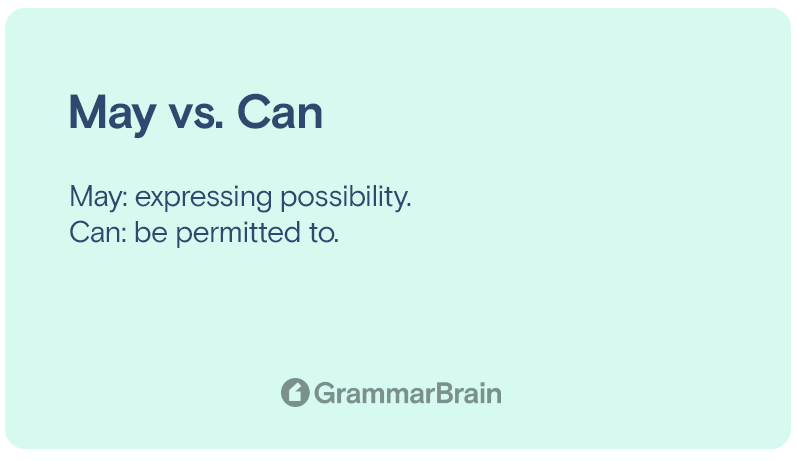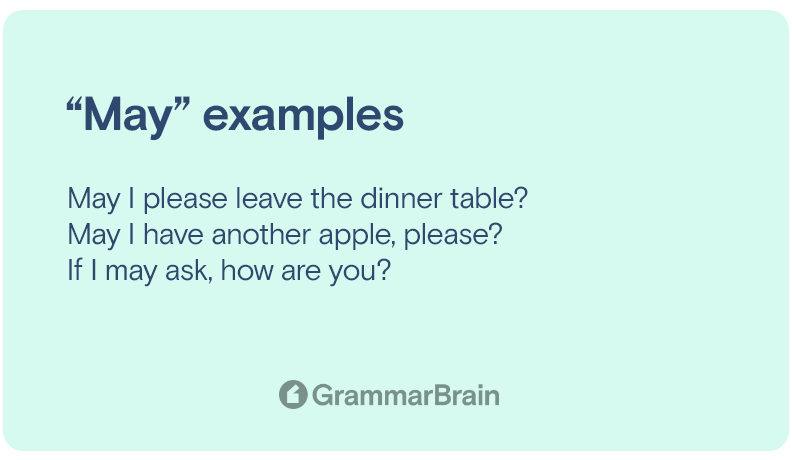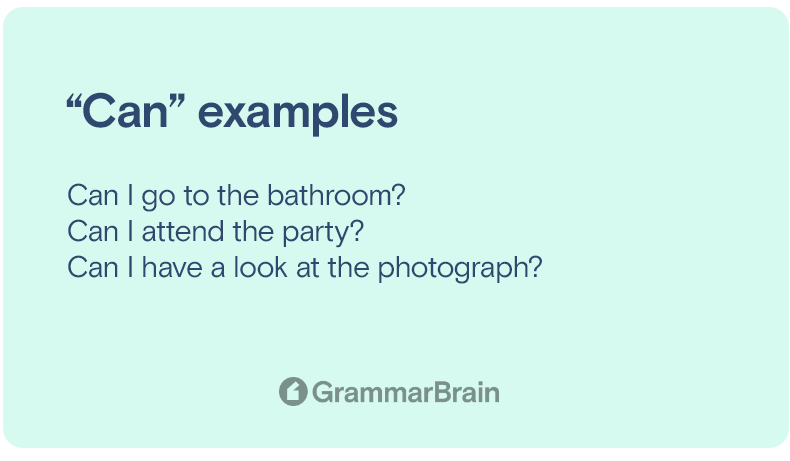What is the difference between “may” and “can?” How are these two words used in American English? Can they get used interchangeably? What are the grammar rules that govern the use of these two words? These are all common questions that get asked when we refer to the words “may” and “can.” Both “may” and “can” are auxiliary verbs that can get used in daily English.
Get answers to these questions and more in this short American English guide.

May vs. Can: Differences and how to use each
The words “may” and “can” generally are used to state that certain things are allowed. However, “may” is a lot more formal. For instance, “You may leave” is formal in contrast to “You can leave anytime.” As children, we are taught to use “may” while seeking permission and “can” for ability. Though the word “ Can” is also used to seek permission, it is considered informal.
A joke that is quite popular with the usage of the word “can” goes like this:
A student asks his teacher, “Can I use the bathroom?” To which the response from the teacher is pretty quick “I have no idea – can you?” These two words indicate that the right words to be used for asking permission are “may” and “can,” which talk about the individual’s ability.
The difference in the tone of two words
Mentioned below are two almost identical questions:
- May I go to the store?
- Can I go to the store?
So, what is the difference between the two? The difference between these two sentences lies in the tone of writing.
Though the words ask the same thing in the sentences, the word “May,” when used, gives a formal sound to the sentence. On the contrary, the word “can” gives the sentence a casual level.

A few more examples of tone shifts are:
- May I use the bathroom?
- Can I use the bathroom?
- May I have a look at that photograph?
- Can I have a look at that photograph?
- May I attend the party?
- Can I attend the party?
In the above examples, context clues and common sense indicate that the individual isn’t talking about their physical ability to perform any task. Both the words have been made acceptable to ask and grant permission, though the word “may” is quite appropriate for a formal request.

Negative usage of the words
There can be a tone difference when the two words are used negatively. The words “cannot” and “may not” can be used in any formal setting.
When these words are used in contractions to get a casual tone, the words “can’t” and “mayn’t” are used.
In everyday conversations, “can’t” is more acceptable than these two options.
When to use the word “can”
There have been a lot of instances outside when we talk of asking permission when the word “can” should be used instead of “may”.
When you wish to convey your ability to do a particular task or activity, the sentence should include the word “can” or “could,” depending on the certainty level of the answer. Below are a few examples of how the word “can” can be used properly.
- Can she play the guitar?
- I can’t reach the office by 2:00
- The new photocopy machine can staple as well as collate copies.
- How can she differentiate between those vegetables and fruits
- He can type 90 words in a minute.
- He can lift about 900 pounds with ease
Usage of the word “may”
Below are a few examples of “may” used in sentences.
- Do you feel she may have given up?
- I may be late today
- You may use the bathroom
- You may take your book
Common questions
FAQs
Is it “may I” or “can I?”
This question is often asked when referring to etiquette or politeness. Technically, “may I” would be the more polite way to ask someone for something.
When should I use “may” or “can?”
Use the word “may” when asking about the possibility of something. And use the word “can” when asking about being permitted to do something. For example, asking a teacher, “Can I use the bathroom?”
Is the word “can” an auxiliary verb?
Yes, the word “can” is an auxiliary verb.
Is “may” an auxiliary verb?
Yes, the word “may” is an auxiliary verb.
What is an auxiliary verb?
An auxiliary verb is a verb that adds functional or grammatical meaning to the clause in which it occurs, so as to express tense, aspect, modality, voice, emphasis, etc.
Inside this article
Fact checked:
Content is rigorously reviewed by a team of qualified and experienced fact checkers. Fact checkers review articles for factual accuracy, relevance, and timeliness. Learn more.
Core lessons
Glossary
- Abstract Noun
- Accusative Case
- Anecdote
- Antonym
- Active Sentence
- Adverb
- Adjective
- Allegory
- Alliteration
- Adjective Clause
- Adjective Phrase
- Ampersand
- Anastrophe
- Adverbial Clause
- Appositive Phrase
- Clause
- Compound Adjective
- Complex Sentence
- Compound Words
- Compound Predicate
- Common Noun
- Comparative Adjective
- Comparative and Superlative
- Compound Noun
- Compound Subject
- Compound Sentence
- Copular Verb
- Collective Noun
- Colloquialism
- Conciseness
- Consonance
- Conditional
- Concrete Noun
- Conjunction
- Conjugation
- Conditional Sentence
- Comma Splice
- Correlative Conjunction
- Coordinating Conjunction
- Coordinate Adjective
- Cumulative Adjective
- Dative Case
- Determiner
- Declarative Sentence
- Declarative Statement
- Direct Object Pronoun
- Direct Object
- Diction
- Diphthong
- Dangling Modifier
- Demonstrative Pronoun
- Demonstrative Adjective
- Direct Characterization
- Definite Article
- Doublespeak
- False Dilemma Fallacy
- Future Perfect Progressive
- Future Simple
- Future Perfect Continuous
- Future Perfect
- First Conditional
- Irregular Adjective
- Irregular Verb
- Imperative Sentence
- Indefinite Article
- Intransitive Verb
- Introductory Phrase
- Indefinite Pronoun
- Indirect Characterization
- Interrogative Sentence
- Intensive Pronoun
- Inanimate Object
- Indefinite Tense
- Infinitive Phrase
- Interjection
- Intensifier
- Infinitive
- Indicative Mood
- Participle
- Parallelism
- Prepositional Phrase
- Past Simple Tense
- Past Continuous Tense
- Past Perfect Tense
- Past Progressive Tense
- Present Simple Tense
- Present Perfect Tense
- Personal Pronoun
- Personification
- Persuasive Writing
- Parallel Structure
- Phrasal Verb
- Predicate Adjective
- Predicate Nominative
- Phonetic Language
- Plural Noun
- Punctuation
- Punctuation Marks
- Preposition
- Preposition of Place
- Parts of Speech
- Possessive Adjective
- Possessive Determiner
- Possessive Case
- Possessive Noun
- Proper Adjective
- Proper Noun
- Present Participle
- Prefix
- Predicate



